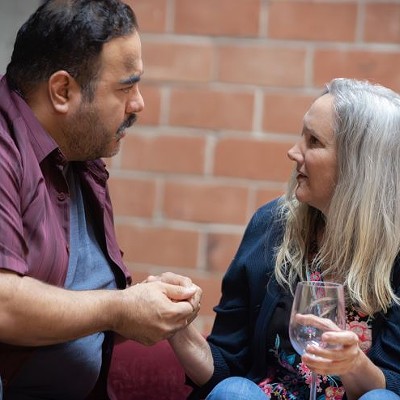Buck Brannaman is a no-nonsense man. This kind of comes with the territory with cowboys, but even among the stoic men and women who spend their lives around horses and cattle, Buck stands out. He's a former trick roper, a family man, a partial inspiration for The Horse Whisperer, a master-class horseman, and a victim of horrific child abuse. In the fantastic documentary Buck, director Cindy Meehl illustrates these things are not coincidental; they are, in fact, the causes and effects that have made Buck who he is. Meehl's documentary unfolds with ease and skill, covering a couple years in Buck's life as he travels around the country performing four-day horse clinics that teach people how to work with their horses, a process that usually requires them to overhaul their own personalities a bit. He makes a convincing and heartfelt case for the care and proper treatment of these animals, and he never sounds preachy or condescending. He's just plain honest. As one of his friends says of Buck, "God had him in mind when he made a cowboy."
The film doesn't have a specific narrative, at least not in the conventional sense. The documentary isn't about Buck trying to rehabilitate a certain horse, or working toward a certain goal, or entering a competition, or doing any of the things he'd probably be doing in a fictional story. Instead, the film acts as a kind of psychobiography that digs into Buck's youth and explores how his childhood traumas shaped the man he became, and how his first-hand experience with abuse gives him the ability to better understand the way an animal thinks and reacts when it believes its life to be in danger. When a colleague of Buck's talks about how people with his skills are often "wounded souls," she's not (just) being poetic; she's actually getting to the heart of what makes Buck good at his job.
There are many powerful moments in the film, but the best are those that show Buck working with the horses and their owners to teach them both to communicate with each other. Because Buck's vaguely Zen-like approach to horsemanship can throw off newcomers -- one of his friends recalls how much like "voodoo" it originally sounded -- Meehl avoids any kind of historical research or soapboxing and simply lets the visuals do the work. Much of the film takes place at various clinics Buck organizes, and watching him soothe these animals as he also retrains their riders is nothing short of amazing. He's not just attuned to a horse's body language or sounds; he's gifted at imagining what kind of emotions he'd be feeling if he were in that horse's situation, and then teaching the owners to respond in kind.
The documentary ultimately deals with responsibility and second chances. Many of the animals Buck deals with are wilder than their owners would like, but Buck's the first to remind people that they can't hold it against the horse for what the animal has gone through. He later says it would never even occur to him to be angry with a horse, even when he's trying to reform it. It's easy to see that Buck wants to give these animals the break he never got, but Meehl never forces that issue or comes across as falsely manipulative. Like Buck, she just wants to speak honestly. The result is a warm, winning film that uses animals to tell a fully human story.





